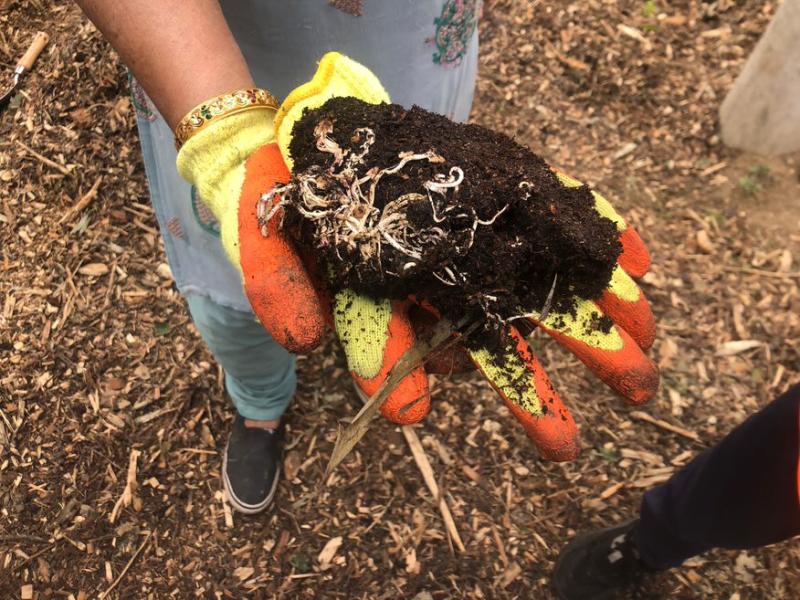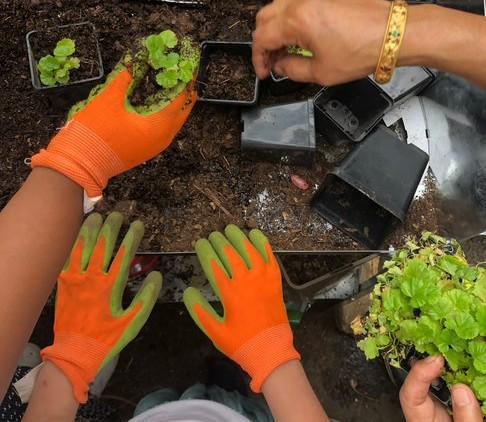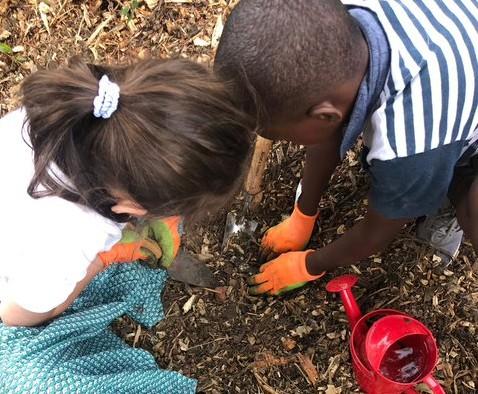Mandy Holden03 Jan 2023
"All of my neighbours in this community have the skills to engage with nature, the only thing that’s lacking is access. I see projects like this as a way to access nature. Children have nature skills too – it’s innate" says Rose Gibbs, a founder at Mountford Growing Community.
This is a small resident-led community organisation in Hackney that seeks to bring people together, improve their health and reduce social isolation, by steadily taking over and greening unloved spaces on Mountford Estate. This summer children and residents gathered weekly to share skills, mulch, plant, seed bomb and care for their green spaces together.
Rose hopes to facilitate the communities’ sense of shared ownership of and belonging to local spaces, so that they genuinely reflect residents’ diverse heritages and act as an outlet for rich horticultural knowledge.
How did she get people involved?
Mountford Growing Community has been a consistent presence on the estate since forming in 2016. Almost all communication is by word of mouth. Rose says sustaining an ongoing relationship between people and place is fundamentally about relationships – between people and with nature.
"Be somewhere where people can talk to you. I discover something new and meet all these different people" explains Rose. This summer, regular gardening sessions have been a great way to be visible. They take place at the same time each week, so families know where and when to find them.
You need to be a point of contact on a regular basis for people who are just passing through or joining the space socially. Mountford’s success is based on longevity and continuity, rather than something that was parachuted in.
Find local friendly faces to lead sessions
Make sure the person running the sessions is someone local people can identify with, trust and relate to. Gardening sessions were facilitated by Senait and Nurjuhan who are local to the community. Rose met them when a neighbour suggested they might be a great fit for the role. Even better, Senait used to work as a local childminder so already knew many of the children.
It’s the simple things too - Xuan, another member of the Mountford team, is a sensitive and perceptive people-person – things like looking people in the eye and really listening make all the difference. Even though Xuan lives a bus ride away, he never feels like a stranger in Mountford.
Nurture skills in the community
Rose often gets offers from organisations to come in and teach her neighbours gardening. Most of the time she says no – they already have the skills and don’t need to be taught. They just need access to resources and space.
"Whenever I’m out gardening people come and tell me about what they want to grow. I always feel there’s way more knowledge than people realise. Even if it’s knowledge that hasn’t been used for a long time" says Rose.
Riz grew up in rural Pakistan and brings his toddler along to the gardening sessions. He wants to share his knowledge and skills with his child. The garden spaces on Mountford Estate enable him to do that.
For Tmnit, whose parents were farmers in Somalia, it’s more about a wish to grow her own food. But she’s also grown in confidence, stepping up to lead some of the sessions whilst Senait was away for a few weeks visiting family.
Put autonomy at the heart
A sense of shared ownership is really important. "One of our missions is to give people autonomy over their immediate environment" says Rose. Taking over patches of land is a form of very direct and immediate engagement with public space and the built environment which can be empowering. It is about giving people a sense that their say is important in how the space functions around them. It should work for people in the way they want it to.
"I’m most pleased by people getting in touch and wanting to start their own thing. This is how it should be." Tmnit has been trying to grow things on her balcony, but nothing works because it’s behind a tree. Rose has been looking around for a spot for her on the estate. Without these kinds of community activities those conversations wouldn’t happen.
Bring together neighbours from different backgrounds
Garden spaces enable residents to come together and socialise in an activity where non-verbal communication comes first through the physical nature of the work: digging, planting and harvesting. This is particularly important where language barriers can leave residents feeling socially isolated.
For Rose’s Turkish Cypriot neighbour who doesn't speak English, the sessions are a relaxed way to expand her network. She’s been coming along to the sessions with her grandson. It’s a route to building connection and she has also been able to demonstrate her horticulture skills with other residents.
Being able to run classes for kids is an important way to build community. Cass, a local mum, works night shifts. It’s going to be hard for her to take her son to green spaces when she’s been working. This is an activity that she can get involved in, but as a parent she doesn’t have to be the one making it happen. Parents - who don’t necessarily speak the same language - can just hang out together.
The children’s enthusiasm has spread to the parents too. Rose says it makes sense for parents and carers. It’s something you can engage in with your children that is also satisfying for an adult. Some parents have asked for advice on what they might plant in their own gardens. Rose is delighted to see folk using the spaces they do have to grow things, rather than perhaps tarmacking them over.
This project has been so effective because there is one particular space - where people used to dump their old garbage - that has been totally transformed. "Doing this project has been a huge help in demonstrating that we can transform other bits of the estate that are depressing to look at. They could be these amazing community spaces that everyone enjoys."
Share skills and see how things snowball
For a project to succeed it’s important for organisers to build on and share their experience. Rose now has skills she can pass on to help others start their own projects. Senait and Nurjuhan have ambitions to adapt the Mountford model for their own estate. Xuan would like to find ways to transform the café he runs into a social enterprise where the focus is on sharing cooking skills, Rose plans to sit down with him to work on a mission statement, think about partners in his community and where to look for funding.
Rose also understands what can get in that way – getting the correct policies in place, as well as finding insurance and setting up a bank account for a new organisation can be more or less difficult depending on who you are. Many people can be put off by the wall of text. Navigating the system isn't easy either when you might not know who and what to ask for.
On a recent ‘walk around’, Rose finally persuaded the Council to relocate some play equipment that no-one uses because it’s beneath trees and to pull up the tarmac. The community can plant there now too. By building the numbers at the local level and at the right kind of pace (slowly), when Mountford asks the Council for more bits of space they now say yes!
If you'd like to know more about what we learned from running the Local Nature Innovation Fund, please get in touch. And if you'd like to find out more about the individual projects, please contact us and we'll pass on your details.




